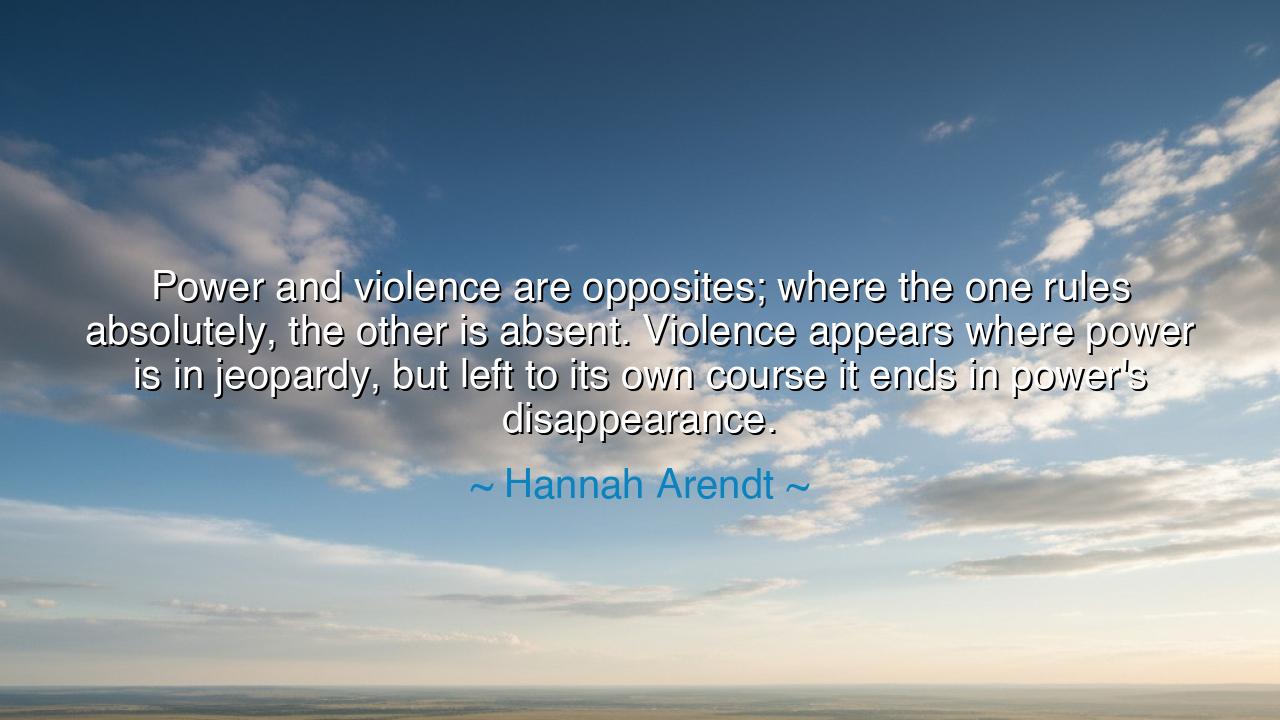
Power and violence are opposites; where the one rules
Power and violence are opposites; where the one rules absolutely, the other is absent. Violence appears where power is in jeopardy, but left to its own course it ends in power's disappearance.






In these profound words, Hannah Arendt draws a stark distinction between power and violence, revealing a paradox at the heart of human governance. She declares that where power rules absolutely, violence has no place; it emerges only where authority is threatened or fragile. Arendt’s insight reminds us that true strength lies not in coercion or force, but in the recognition and consent of those over whom power is exercised. When violence becomes the instrument of rule, it signals the vulnerability of power itself, and its eventual erosion is inevitable.
The origin of this observation lies in Arendt’s extensive study of totalitarian regimes and the nature of political authority. Writing in the aftermath of the Second World War and the rise of oppressive governments, she witnessed firsthand how leaders often rely on terror when legitimacy falters. Arendt’s scholarship, particularly in works like On Violence and The Origins of Totalitarianism, underscores that violence is a symptom, not a source of power—a desperate tool wielded when consent, tradition, or moral authority has weakened.
History provides striking examples of this dynamic. Consider Nero’s Rome, where the emperor’s reliance on violence to maintain control—through purges, executions, and spectacles of terror—reflected the fragility of his rule. His authority was sustained not by the genuine power of civic recognition, but by fear, which ultimately proved insufficient; Nero’s Rome descended into chaos, demonstrating Arendt’s assertion that unchecked violence erodes the very power it seeks to enforce.
Arendt’s words also speak to the subtle ethical dimension of governance. Power, in its truest form, arises from collective trust, mutual recognition, and voluntary adherence to law or principle. Violence, by contrast, is coercive and alienating, alienating the governed and undermining legitimacy. This tension is evident in more modern contexts as well, from the revolutions of the 18th century to the civil rights struggles of the 20th century, where movements grounded in nonviolence often commanded enduring moral and political power, while regimes dependent on coercion eventually collapsed.
Ultimately, this quote is a meditation on strength, legitimacy, and the moral fabric of authority. Arendt instructs future generations that the essence of durable power lies not in the sword, but in the consent and recognition of the people. Let this teaching endure: violence may temporarily command obedience, but it cannot create lasting power. True authority flourishes when it is rooted in legitimacy, shared purpose, and the voluntary will of those governed, for when force replaces respect, power sows the seeds of its own disappearance.






NMVy - 9/2 Nguyen Ngoc Minh
I love how Arendt draws a clear moral and philosophical boundary here. It’s unsettling but true—violence is seductive because it produces instant results, while real power is slow, collective, and invisible. It makes me wonder how societies can cultivate power without falling into the illusion of strength through aggression. Is violence inevitable when people lose faith in dialogue, or can wisdom ever fully replace fear as a source of control?
NHVinh Nguyen hong
This quote makes me rethink what strength really means. If violence destroys power over time, then the most powerful systems must be the ones that operate through cooperation, not domination. I wonder how this applies to modern politics and even workplaces. When leaders resort to intimidation or fear, are they actually revealing insecurity? Arendt seems to suggest that durable authority comes from persuasion, not punishment.
CLviet ai chau ly
What stands out to me here is the precision of Arendt’s logic. She’s describing a paradox—violence feels powerful but actually signals the loss of power. It’s a chilling insight when you think about revolutions, dictatorships, or even personal relationships. The more one relies on force, the less true influence they have. So maybe the real test of power is how peacefully it can sustain itself.
PNHa phuong Nguyen
I find this statement incredibly thought-provoking. Arendt separates power from violence in a way that challenges how we perceive authority. If violence only arises when power is threatened, then stability depends more on trust than coercion. It makes me question modern institutions—how many of them maintain order through fear rather than genuine respect? Maybe the moment force is used, real power has already started to crumble.
GDGold D.dragon
This quote is fascinating because it completely flips the usual association between power and violence. Hannah Arendt’s view suggests that true power doesn’t need violence—it’s grounded in legitimacy and consent. Violence, then, is a symptom of weakness, not strength. That idea feels so relevant today, especially when political leaders use force to assert control. It makes me wonder: can a regime that relies on violence ever truly claim to be powerful?